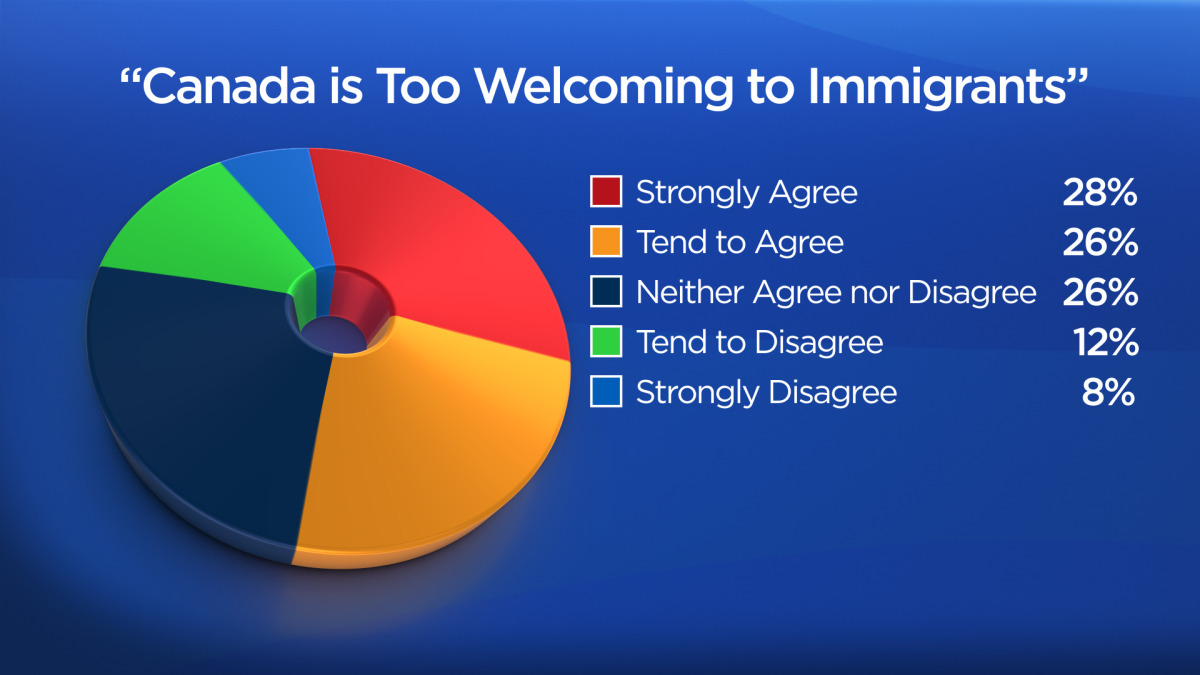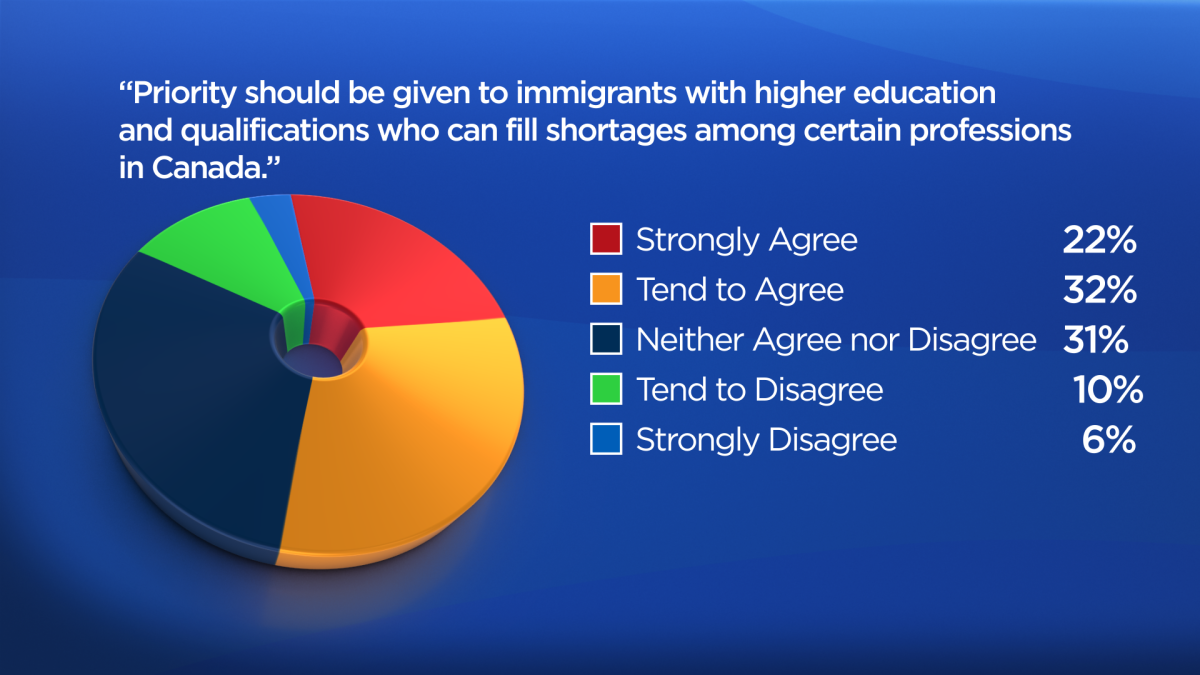Canadians have stronger negative feelings about immigration in 2018 than they did in 2017, a new poll from Ipsos reveals, but some of those beliefs may not be based on evidence.

The poll, conducted exclusively for Global News, found 54 per cent of respondents feel that Canada is currently too welcoming to immigrants.
WATCH: Family set to be deported on Christmas Eve has been granted stay in Canada
.jpg?w=1040&quality=70&strip=all)
Ipsos CEO Darrell Bricker says Canadians seem to be more concerned than ever before about the process by which immigrants are admitted to Canada.
“In Canada the focus doesn’t seem to be on the immigrants themselves, more about the process of how someone gets into the country,” Bricker said.
The rise in negative attitudes towards immigration could be attributed to the surge in asylum seekers who have entered Canada irregularly from the U.S, more than 36,000 people since the start of 2017. Federal Conservatives have blasted Justin Trudeau’s government over the issue and have branded it a “crisis.”
READ MORE: Is Canada facing an asylum seeker ‘crisis?’
And while those numbers represented a dramatic spike in irregular border crossings, the more than 18,000 who crossed in 2017 accounted for just over one-third of the 50,469 people who made refugee claims that year. Canada has also dealt with similar numbers in the past, like in 2001, when 44,640 refugee claims were made.
Other reports have found the Great White North isn’t so welcoming when it comes to visitors. The Globe and Mail reported last July that visa applications have been rejected at higher rates under the Trudeau government than under previous governments.

Get breaking National news
WATCH: Ipsos poll finds Canadians hardening stance on immigration

While 18 per cent of the one million people who applied for a visitor visa were rejected in 2012, that number rose to 26 per cent out of two million applicants in 2016, according to the report. In addition, the first three months of 2018 alone saw 30 per cent of visa applicants rejected.
Bricker says Canadians seem to be falling victim to the anti-immigrant sentiment cropping up in other parts of the world — like the United States and Europe — but the problem is nowhere near the levels seen in some European countries.
“I don’t think Canada is immune to what we’ve seen other parts of the world, so yes, there is the potential that someone could throw a match and this could be a combustible issue,” Bricker said. “Since we look at this on a global basis, public concern about immigration in Canada is not what it is in France or Germany.”
The poll also revealed that 40 per cent of Canadians believe that an influx of immigrants could make it more difficult for Canadian citizens to get jobs. Despite this, much of Canadian immigration deals precisely with the labour shortages that the home-grown workforce isn’t able to fill.
Not only has Canada’s unemployment rate decreased 8.5 per cent in 2010 to 5.6 per cent in 2018, a Conference Board of Canada study released last May claims cutting immigration would actually have a negative impact on the economy by 2040.
WATCH: Maxime Bernier claims People’s Party of Canada true conservative choice

Bringing in young, working-age immigrants also helps address the issue of Canada’s aging population, according to the report.
The report states that in a Canada where immigration was abandoned entirely, 26.9 per cent of the population would be 65 and older by 2040. In addition, Canada’s potential economic growth would slow from 1.9 per cent to an average of 1.3 per cent annually without immigration, Global News previously reported.
Victoria Esses, the head of the Esses Lab for the Study of Intergroup Relations at Western University, told Global News in an interview at the time that she agreed with the findings of the Conference Board of Canada report.
- ‘Something just went off’: Canadians in Middle East describe ‘surreal’ Iran missile strikes
- Queen’s University students stranded in Doha after Iran attack shuts down airspace
- Khamenei’s death met with ‘jubilation’ among Iranian-Canadians: Liberal MP
- ‘At first I cried’: How Iranian Canadians are reacting to the U.S. strikes in Iran
“Without immigration, our labour force would shrink. Immigrants contribute significantly to the labour force because they come in at a fairly young age, and they have many years of work ahead of them,” Esses explained.
The poll also found that more than half of Ipsos respondents stated that priority should be given to immigrants with higher education and qualifications. The Canadian government is already quite selective when it comes to admitting immigrants based on their education and professional status.
Immigration Minister Ahmed Hussen announced last October that Canada plans to increase its immigration levels to 350,000 in 2021 with the vast majority of them selected to address skills shortages and gaps in our labour markets.
Sean Rehaag, a professor at York University, speculates the rise in fear-based assumptions about immigration among Canadians can be traced back to the growth of far-right movements around the world.
“It is not surprising that there may have been a recent uptick in anti-immigrant sentiment detected in this poll. The growth of far-right movements around the world may make people feel more comfortable echoing xenophobic and racist views,” Rehaag stated.
“Moreover, some irresponsible politicians in Canada have tried to improve their fortunes by demonizing immigrants and refugee claimants, and by making alarmist (and false) assertions about a loss of Canadian sovereignty and about Canada’s borders being out of control,” he continued.
He warns that stoking an anti-immigrant sentiment could backfire in the long term.
“Notwithstanding the recent alarmist political rhetoric, Canadians will eventually see that the sky is not falling, that the number of refugee claimants coming in is manageable, that the system is doing its job, and that immigrants and refugees make huge contributions to Canadian society,” he said.
A sample of n= 2,001 Canadians aged 18+ was sampled via the Ipsos I-Say panel and non-panel sources from December 7 to 12, 2018. Quotas and weighting were employed to ensure that the sample reflects that of the Canadian population by region, age and gender according to Canadian census information. The precision of Ipsos online polls is measured using a credibility interval. In this case the results of the poll are considered accurate to within +/- 2.5 percentage points, 19 times out of 20, of what the results would be had all Canadian adults been polled.










Comments
Want to discuss? Please read our Commenting Policy first.